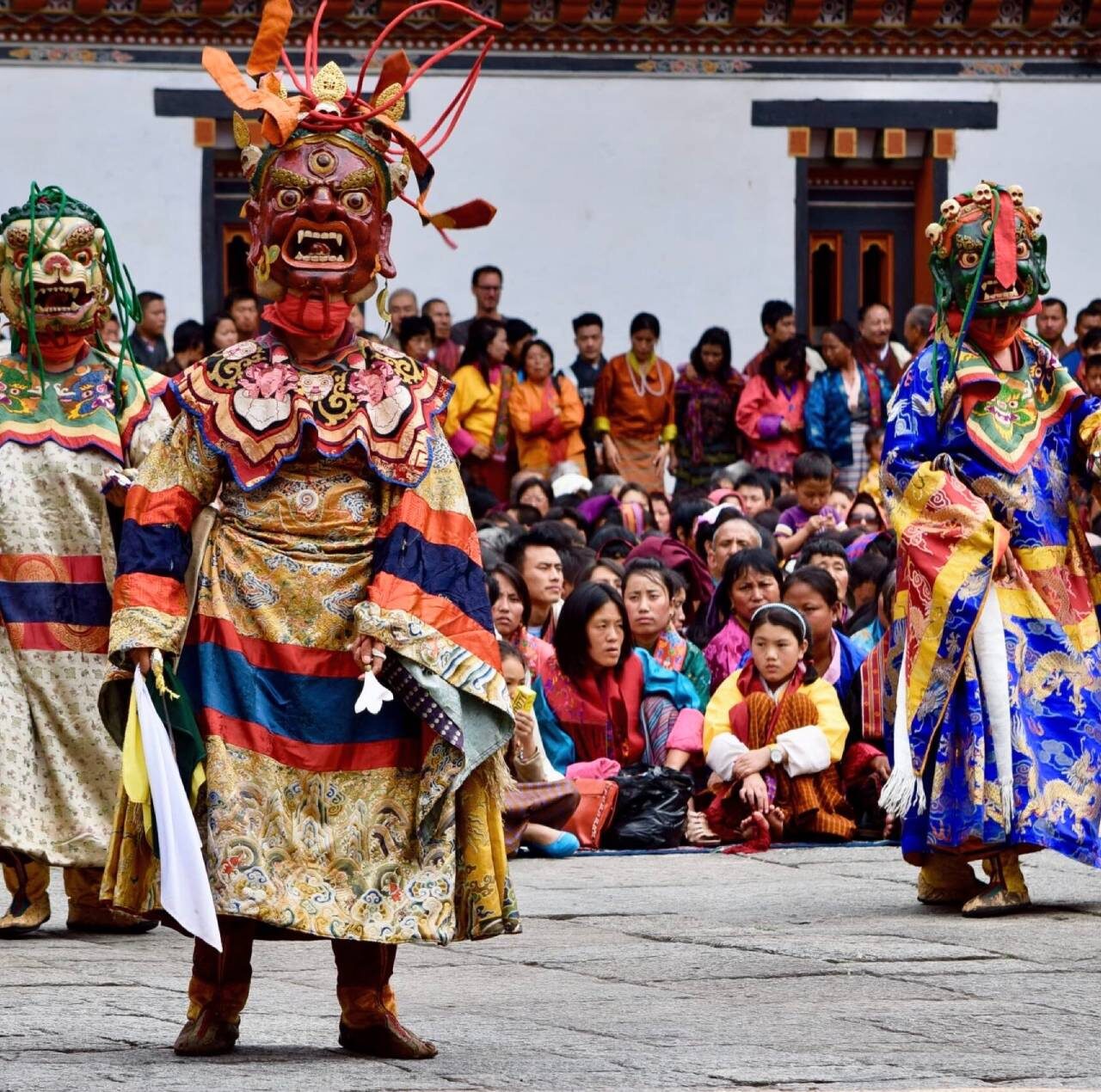A JOURNEY THROUGH THE HISTORY OF BHUTAN
Always On the Move
- Information
- Tour Plan
- Location
- Gallery
- Reviews
- Similar Tours
What's included
- A guided tour of important places
- Beautifully illustrated souvenir map
- Current Hotel Taxes and Service Charges
- Entrance tickets to monuments and museums
- First class or best available hotels in the area
- Meals, unless expressly states
- Observation and participation in allowed activities
- Professionally guided tour
- Tips to guide and driver
- Departure Taxes or Visa handling fees
- Excess baggage charge
- Increases in airfares or Government imposed taxes
- International Air, unless expressly paid for
- Medical insurance and emergency insurance
- Other International flights
- Personal expenses
- Porterage for a maximum of two bags per person
- Services not specifically stated in the itinerary
- Tips to guide and driver
- Unlimited bottled water
- Visa arrangements

- Visit Bhutan – The Last Great Himalayan Kingdom.
- Day 1
- Day 2
- Day 3
- Day 4
- Day 5
- Day 6
- Day 7
- Day 8
- Day 9
- Day 10
- Day 11
- Day 12
The Kingdom of Bhutan is a landlocked country and the smallest state in Asia. Thimphu is its capital and largest city, while Phuntsholing is its financial center.
The King of Bhutan is known as the “Dragon King”. Bhutan is also notable for pioneering the concept of gross national happiness. The country’s landscape ranges from lush subtropical plains in the south to the sub-alpine Himalayan Mountains in the north, where there are peaks in excess of 7,000 metres (23,000 ft). The highest mountain in Bhutan is the Gangkhar Puensum, which is also a strong candidate for the highest unclimbed mountain in the world. There is also diverse wildlife in Bhutan.
Bhutan, a Buddhist kingdom on the Himalayas’ eastern edge, is known for its monasteries, fortresses (or dzongs) and dramatic landscapes that range from subtropical plains to steep mountains and valleys. In the High Himalayas, peaks such as 7,326m Jomolhari are popular trekking destinations. Paro Taktsang monastery (also known as Tiger’s Nest) clings to cliffs above the forested Paro Valley.
Visit this mystical Kingdom with Art Of Travel India Holidays.
12 days tour – Discover & Explore the history and origin of Bhutan with this Bhutan Historical Tour.
Arrive Paro by Druk Air
Druk Airways flight to Bhutan is one of the most spectacular in entire Himalayas. Whether flying along the Himalayan range from Kathmandu or over the foothills from Kolkatta, each flight is a mesmerizing aeronautical feat and offers an exciting descent into the Kingdom.
gangtey phobjikha valley BhutanOn arrival at Paro airport, immigration and custom formalities and then received by our representative and transfer to the hotel.
Evening take a stroll around town’s main street. Overnight at the hotel in Paro.
Paro
After breakfast, visit Ta Dzong (National Museum) and then walk down the trail to visit Rinpung Dzong which has a long and fascinating history.
Afternoon visit Drukgyel Dzong, the ruined fortress from where Bhutanese repelled several invasion by Tibetan armies. Then visit a traditional farm house which offers good insight into lifestyle of local people.
In the evening, visit Kyichu Lhakhang, one of the oldest and most sacred shrines of the Kingdom.
Overnight at the hotel in Paro.
Paro / Thimphu (60 km, 2 hours)
After breakfast proceed to Thimphu, the modern capital town of Bhutan. Enroute stop at Chuzom (confluence) where Paro river joins Thimphu river. Nearby Thimphu, visit Simtokha Dzong, the oldest fortress of the Kingdom which now houses the School for Buddhist studies.
Afternoon, in Thimphu, visit King’s Memorial Chhorten and Trashichhodzong, beautiful medieval fortress/monastery.
Then, visit Handicrafts Emporium, Textile and Folk Heritage Museum followed by visit local market.
Overnight at the hotel in Thimphu.
Thimphu – Punakha (70 km, 3 hours)monks in training
Morning, Thimphu sightseeing, visiting National Library, Painting School and Traditional Medicine Institute.
After lunch, drive to Punakha, the old capital town of Bhutan. Stop enroute at Dochula pass (3,050m) that heralds the most enchanting views of Bhutan.
On arrival, check into the hotel. Evening visit Punakha Dzong, the fortress of 17th century and later visit Khamsm Yulley Namgyal Chhorten.
Overnight at the hotel in Punakha.
Punakha / Wangduephodrang / Gangtey (70 km, 3 hours)
After breakfast drive to Gangtey via Wangduephodrang. Visit majestic Wangdue Dzong and interesting local market.
Further ahead pass through dense forests and oak, rhododendron tress, reaching at Gangtey (Phobjikha).
Evening take a walk around Gangtey village and visit Gangtey Gompa, the only Nyingmapa monastery in this region.
Overnight at Camp / Guest House.
Gangtey / Trongsa (120 km, 4.1/2 hours)
Morning explore Phobjikha valley which is famous for Black Necked Cranes. The cranes migrate here from Central Asiatic plateau to escape its harsh winters.
After lunch drive to Trongsa crossing 3,300m high Pele la pass. Evening visit Trongsa market.
Overnight at the lodge in Trongsa.
Trongsa / Bumthang (68 km, 3 hours)
Morning visit Trongsa Dzong, the master piece of Bhutanese architecture and see Ta Dzong, the watch tower, built to defend this Dzong and surrounding region.
After lunch, proceed to Bumthang, the religious heartland of the nation. Evening at leisure. Dinner and overnight at the lodge in Bumthang.
Bumthang
Bumthang is the general name given to combination of four valleys – Chumey, Choekhor, Tang and Ura with altitude varying from 2,600m to 4,000m. It is home to many of prominent Buddhist temples and monasteries.
Visit Tamshing Lhakhang, the treasure house of interesting religious Buddhist paintings. Then visit, Jakar Dzong, the administrative centre of the valley.
Afternoon visit Kurje Lhakhang, one of the most sacred places. Later visit Jambay Lhakhang, the ancient monastery dating from the introduction of Buddhism in the country.
Evening visit local shops. Overnight at the lodge in Bumthang.
Bumthang / Wangduephodrang (205 km, 7 hours)
Morning after visiting Bumthang market, drive to Wangdue . Lunch would be served enroute at one of the famous restaurant in Trongsa town.
Evening take a stroll around Wangdue town, visiting shops, local market and mingling with people.
Overnight at the hotel in Wangduephodrang.
Wangduephodrang / Paro (77 km, 3 hours)
Morning excursion to Chimi Lhakhang, situated on a hillock in the centre of the valley, is dedicated to Lama Drukpa Kuenley, who in the late 15th century used humour, songs and outrageous behaviour to dramatise his teachings and due to this also known as ‘Divine Madman’. This temple is also known as the temple of fertility. It is widely believed that couples who do not have children and wanting one, if they pray at this temple, they are usually blessed with a child very soon. It is about 30 minute walk across field from the road to the temple. The trail leads across rice fields to the tiny settlement of Pana, meaning ‘field’. It then follows a tiny stream downhill to Yoaka and across more fields before making a short climb to Chimi Lhakhang.
Afteroon drive to Paro. Overnight at the hotel in Paro.
Paro (Excursion to Haa valley)
Start the day early for drive to Haa via Chele-la pass. 4 Km away at Bondey village the road to Haa diverts towards the right hand side and the climb up towards the chele-la pass starts. After driving through blue pine & rhododendron forest for 45 km,Ha Valley Bhutan reach Chele-la pass ( 4200 meters). From this point one can have a superb views of Mount. Chomolhari & Jichu Drakey. This is a very good place to walk around for few minutes enjoying the view. Drive on to Haa, descending all the way for another 22 km (under an hours drive), finally reaching Haa. The Haa Dzong is presently occupied by military, but the view from outside is stunning. After picnic lunch visit the famous Monastery Lhakhang Karpo (White Temple) followed by visit Lhakhang Nagpo (Black Temple). The central shrine in Lhakhang Nagpo is said to have no difference with that of Lhasa JOWO in Tibet. The construction of the Lakhang Karpo is believed to have been assisted by the locality. As a result the place came to be locally known as ‘Hay’ meaning’ surprise’ which later became ‘Haa’ due to the differences in interpretations and pronunciations of different people over time.
The three giant hills looming over the fringes of Haa valley were called ‘Me Rig Puen Sum’ especially after the incidence of the Lhakhang Kdarpo construction. Today the three hills are popularly known as ‘Rig Sum Goenpa’ signijfying three deities-Jambayang Chana Dorji and Chenrizig.
Later, other Buddhist saints like Guru Rinpoche and ‘Machi Labdorn’ came to the Jungney Drag in Haa and blessed the locality. The principal religion followed is Drukpa Kagyud. After the arrival of Shabdrung Ngawang Namgyel, the chief guardian deity of Haa became Ap Chundu.
Later in the afternoon drive to Paro same way back. The drive will be under 3 hours. Overnight at the hotel in Paro.
More about Buthan
Travelicious Review
the cultural heritage of the country, where each stop reveals an important chapter of its history. Travelers visit the ancient Taktshang Monastery, known as the Tiger's Nest, which is not only a sacred site but also a symbol of Bhutanese perseverance and spirituality. Additionally, the tour includes visits to local markets, where you can see traditional crafts and learn about customs that have endured over the centuries.










There are no comments yet.